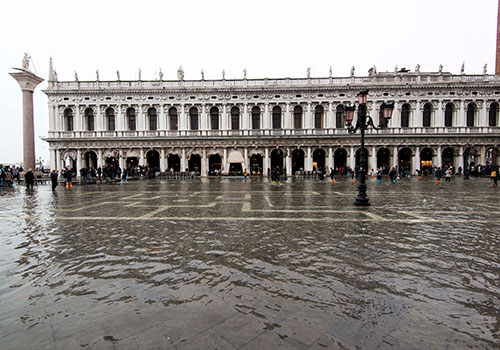L’innalzamento del livello del mare: quanto conosciamo i suoi effetti sulla nostra vita?
Un invito agli abitanti delle zone costiere, e non solo, per il questionario del progetto europeo SAVEMEDCOASTS-2
[Roma, 19 marzo 2021]
La questione del riscaldamento globale è ormai presente in molte agende politiche dei paesi occidentali. Le conseguenze sul territorio e sulle popolazioni, spesso gravi, hanno spinto i governi a porre un’attenzione primaria anche verso quei fenomeni naturali che avvengono in un lasso di tempo di decenni e, per questo, destano un allarme sociale che appare non proporzionato al reale pericolo.
L’aumento della temperatura, l’effetto serra, lo scioglimento dei ghiacciai sono tra le principali cause dell’innalzamento del livello del mare, un processo lento ma inesorabile che potrebbe portare, in un futuro non lontano, a ridisegnare le nostre coste.
Tra le tante zone che in Italia destano molta attenzione, sono la laguna Veneta e il nord Adriatico, le coste del Basento e della Sicilia, isole Eolie comprese, ma ci sono situazioni molto simili anche in altri paesi: nei territori dei delta dell’Ebro in Spagna, del Nilo in Egitto o del Rodano in Francia il fenomeno è molto evidente. E nel mondo tante altre zone costiere rischiano di essere abbandonate se le condizioni di vita dovessero essere compromesse dalla conquista di terra da parte del mare.
Con il progetto europeo SAVEMEDCOASTS-2, finanziato dalla Protezione Civile Europea (DG-ECHO) di cui l’Istituto Nazionale di Geofisica e Vulcanologia (INGV) è capofila, i ricercatori si propongono non solo di studiare gli effetti dell’aumento atteso di livello marino nel Mediterraneo ma anche di preparare materiale didattico e divulgativo sul fenomeno, per aumentare la consapevolezza nella popolazione.
Lo scopo non è solo quello di informare ma è, soprattutto, quello di rendere consapevoli del fatto che comportamenti adeguati possono contribuire sensibilmente alla mitigazione dell’impatto del fenomeno, in attesa che una società e un'economia molto più “green” risolvano in maniera efficace e veloce almeno una parte delle emergenze ambientali.
Quanto le comunità locali, e non solo quelle che vivono in zone costiere, conoscono davvero questa situazione?
I ricercatori vogliono chiederlo proprio a loro.
Per questo, sul sito web di tutti possono rispondere ad un semplice questionario, del tutto anonimo, che ha lo scopo anche di capire quali sono gli aspetti del problema su cui, secondo i cittadini, è più urgente intervenire.
I questionari sono disponibili in quattro lingue: inglese, italiano, greco e spagnolo, Paesi dove si svolgono le attività di SAVEMEDCOASTS2-2.
I dati raccolti verranno utilizzati ai soli fini del progetto o per pubblicazioni scientifiche.
La partecipazione di tutti è importante perché ogni risposta è una fonte preziosa di informazioni, e non una semplice… goccia nel mare!
#ingv #savemedcoasts2 #mediterraneo #dgecho
Sea level rise:how well do we know the effects on our life?
A call to the population of the coastal areas, and beyond, for the questionnaire of the European project SAVEMEDCOASTS-2
[Rome, March 19, 2021]
The issue of global warming is now on the political agendas of many Western countries.
The often-serious consequences on land and people have prompted governments to pay close attention also to those natural phenomena that occur over decades and, for this reason, arouse a social alarm that does not seem proportionate to the actual hazard.
The increase in temperature, the greenhouse effect, the melting of glaciers are among the main causes of sea level rise, a slow but inexorable process that could very soon lead to redesigning our coasts. In Italy the Venetian lagoon, the northern Adriatic Sea, the coasts of Basento and Sicily, including the Aeolian Islands, are among the many areas that catch the attention; similar situations are in other countries: in Spain in the Ebro delta, in Egypt in the Nile delta or in France in the Rhone delta the phenomenon is very evident.
In the world, many other coastal areas are at risk of being abandoned if the conditions of life were to be compromised by the conquest of land by sea.
Through the European project , funded by the European Civil Protection (DG-ECHO), led by the National Institute of Geophysics and Volcanology (INGV), scientists aim to study not only the effects of the expected sea level rise in the Mediterranean; they also want to prepare educational and informative material on the phenomenon, to raise awareness among the population.
The goal is not only to inform but, above all, to raise awareness on the fact that adequate behavior can significantly contribute to mitigating the impact of the phenomenon, while waiting for a much greener society and economy to resolve effectively and quickly at least part of the environmental emergencies.
How much do local communities really know about this situation, and not just those living in coastal areas?
Scientists really want to ask them.
For this reason, on the website everyone can answer a simple, completely anonymous, questionnaire, which also aims to understand those aspects of the problem on which, according to citizens, it is compelling to intervene.
The questionnaire is available in the four languages of the countries where SAVEMEDCOASTS2-2 activities take place: English, Italian, Greek and Spanish.
The data collected will be used exclusively for the purposes of the project or for scientific publications.
The participation of all is essential because each answer is a precious source of information, and not a simple... drop in the sea!
Link to





